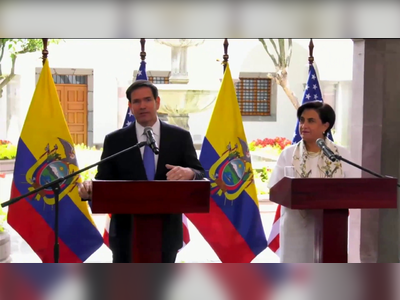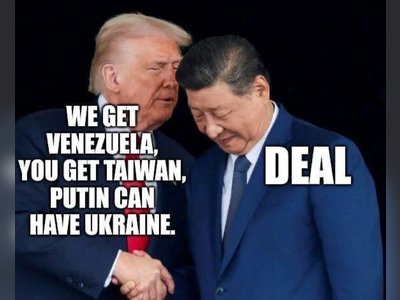Argentina Defies Predictions with Record $17 Billion Trade Surplus, But Is the Growth Sustainable?
Despite global economic turbulence, Argentina's remarkable trade surplus signals strategic moves in primary exports and import reduction. However, questions loom over long-term sustainability and risks.
Argentina has stunned the global economic community with a record seventeen billion dollar trade surplus, defying widespread predictions that the country’s economy would continue to struggle amidst rising inflation and currency volatility.
This is especially remarkable considering the current global economic turbulence, which has affected many other nations' ability to generate trade surpluses.
For Argentina, this surplus marks a significant milestone in what has been a complex economic narrative in recent years.
The key driver behind this impressive achievement has been Argentina’s export boom, particularly in primary products and agricultural goods.
The country has long been known for its agricultural prowess, but the recent uptick in exports suggests a strategic pivot, capitalizing on its vast natural resources to generate foreign currency and stabilize its finances.
It’s a clear sign that Argentina is positioning itself as a more competitive player in global markets, focusing on what it does best: harnessing its agricultural potential.
However, there are critical questions about whether this surge in exports and the resulting trade surplus can be sustained.
Much of Argentina’s current growth relies heavily on primary industries—namely, agriculture and natural resources.
These sectors are vulnerable to global price fluctuations, and without significant diversification, the economy could be at risk of a boom-bust cycle.
Argentina’s success in generating this surplus could be short-lived if global demand shifts or if commodity prices fall.
In response to mounting economic pressures, Argentina has also implemented a significant reduction in imports, particularly in fuel.
This strategy reflects a clear attempt to bolster self-reliance and reduce dependency on foreign goods, which has been seen as necessary in an era where global supply chains have been severely disrupted.
By cutting imports, Argentina seeks to protect its domestic industries and conserve foreign currency.
However, this move comes with its own risks.
While the reduction in imports might provide short-term relief, there is concern that it could limit access to essential goods and technologies that Argentina’s industries need to remain competitive on the global stage.
This is a difficult balancing act, and the real test will be whether these short-term measures can lead to long-term prosperity.
Despite the positive figures for exports and the trade surplus, Argentina’s annual GDP still reflects a decline, revealing the economic fragility beneath the surface.
Growth in the third quarter of 2024 was notable, but it remains to be seen if this momentum can carry forward in the coming years.
At the heart of Argentina’s strategic maneuvers is Economy Minister Luis Caputo, whose leadership has been pivotal in securing twelve consecutive months of trade surplus.
This consistency is a strong indicator of policy effectiveness and provides a foundation for future economic resilience.
It’s a remarkable achievement, but one that must be built upon with sustainable economic policies that go beyond short-term fixes.
Argentina's journey over the past year is akin to a high-stakes chess game.
As the legendary chess grandmaster Bobby Fischer once said, 'You have to have the fighting spirit.
You have to force moves and take chances.' In this sense, Argentina is certainly demonstrating its ability to navigate the complex global economic landscape with calculated moves.
But will these moves lead to checkmate, or will they expose vulnerabilities that could undermine future growth?
In many ways, Argentina’s economic saga represents a global lesson in the art of economic strategy.
The country’s resilience in the face of adversity is commendable, but as it pushes forward with its trade surplus and export-driven growth, it must remain vigilant.
The balance between survival and long-term prosperity is delicate, and it will be fascinating to see how Argentina evolves in this dynamic environment.
This is especially remarkable considering the current global economic turbulence, which has affected many other nations' ability to generate trade surpluses.
For Argentina, this surplus marks a significant milestone in what has been a complex economic narrative in recent years.
The key driver behind this impressive achievement has been Argentina’s export boom, particularly in primary products and agricultural goods.
The country has long been known for its agricultural prowess, but the recent uptick in exports suggests a strategic pivot, capitalizing on its vast natural resources to generate foreign currency and stabilize its finances.
It’s a clear sign that Argentina is positioning itself as a more competitive player in global markets, focusing on what it does best: harnessing its agricultural potential.
However, there are critical questions about whether this surge in exports and the resulting trade surplus can be sustained.
Much of Argentina’s current growth relies heavily on primary industries—namely, agriculture and natural resources.
These sectors are vulnerable to global price fluctuations, and without significant diversification, the economy could be at risk of a boom-bust cycle.
Argentina’s success in generating this surplus could be short-lived if global demand shifts or if commodity prices fall.
In response to mounting economic pressures, Argentina has also implemented a significant reduction in imports, particularly in fuel.
This strategy reflects a clear attempt to bolster self-reliance and reduce dependency on foreign goods, which has been seen as necessary in an era where global supply chains have been severely disrupted.
By cutting imports, Argentina seeks to protect its domestic industries and conserve foreign currency.
However, this move comes with its own risks.
While the reduction in imports might provide short-term relief, there is concern that it could limit access to essential goods and technologies that Argentina’s industries need to remain competitive on the global stage.
This is a difficult balancing act, and the real test will be whether these short-term measures can lead to long-term prosperity.
Despite the positive figures for exports and the trade surplus, Argentina’s annual GDP still reflects a decline, revealing the economic fragility beneath the surface.
Growth in the third quarter of 2024 was notable, but it remains to be seen if this momentum can carry forward in the coming years.
At the heart of Argentina’s strategic maneuvers is Economy Minister Luis Caputo, whose leadership has been pivotal in securing twelve consecutive months of trade surplus.
This consistency is a strong indicator of policy effectiveness and provides a foundation for future economic resilience.
It’s a remarkable achievement, but one that must be built upon with sustainable economic policies that go beyond short-term fixes.
Argentina's journey over the past year is akin to a high-stakes chess game.
As the legendary chess grandmaster Bobby Fischer once said, 'You have to have the fighting spirit.
You have to force moves and take chances.' In this sense, Argentina is certainly demonstrating its ability to navigate the complex global economic landscape with calculated moves.
But will these moves lead to checkmate, or will they expose vulnerabilities that could undermine future growth?
In many ways, Argentina’s economic saga represents a global lesson in the art of economic strategy.
The country’s resilience in the face of adversity is commendable, but as it pushes forward with its trade surplus and export-driven growth, it must remain vigilant.
The balance between survival and long-term prosperity is delicate, and it will be fascinating to see how Argentina evolves in this dynamic environment.











